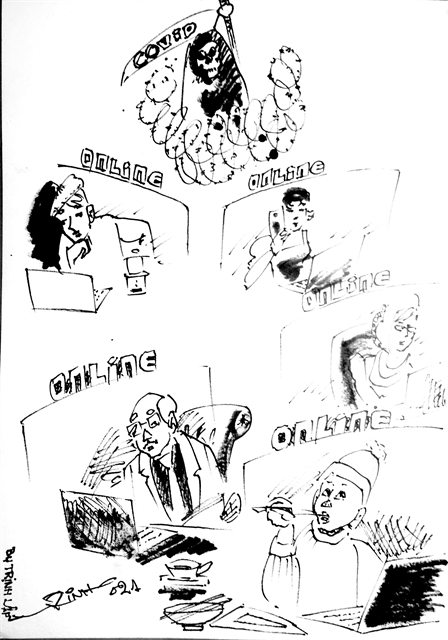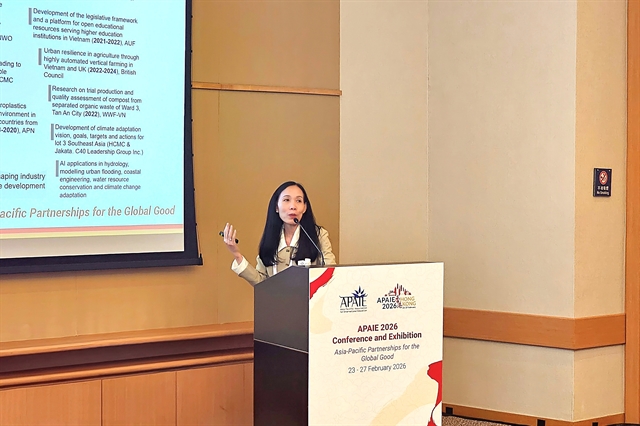 Talk Around Town
Talk Around Town

After months of working from home, some local residents in HCM City are reluctant to return to their workplace.

|
| Illustration by Trịnh Lập |
By An Phương
After months of working from home, some HCM City residents are reluctant to return to their workplace.
Even though the city has reopened and companies have started to welcome employees back to the office, many people told Việt Nam News that the pandemic had essentially wrecked their daily routines and anxiety had emerged as they had to rebuild old working habits.
Of the five friends with whom I’ve had a discussion, three of them preferred the remote mode of work very much.
Ngọc Anh, 27, a graphic designer, said that she was able to keep up with her heavy workload during months of lockdown.
“I used to visit the company six days a week and be on my laptop 10 hours a day. There I would constantly receive feedback and make changes if necessary. Days at home made me realise that everything could be done efficiently in the comfort of my own space. Privacy and flexibility have indeed boosted my creativity,” she said.
“I wouldn’t complain if my company asks me to continue working from home,” she added.
Gia Kỳ, 26, who works at a media company, shared a similar experience. He said that applications such as Zoom, Teams and Google Meet played a crucial role in keeping communication between his team members going.
“Despite initial struggles and discomfort, and the fact that media-related jobs usually involve a lot of offline interactions, I have become used to working remotely after three months of lockdown. Rebuilding old working habits is not easy,” he said.
“Being present at the office doesn’t guarantee top notch performances. Mindful planning does!” he added.
Kỳ also pointed out that as COVID-19 had altered people’s perceptions about how to go about life, another change might mentally push people to their limit. It’s obvious that many people tended to avoid new events.
I agreed with Kỳ and felt glad to see how the topic of mental health has emerged more frequently these days.
According to research by UNICEF, the impact of COVID-19 on the mental health of adolescents and young people between 13 and 29 years old is clear. While many were reported to have experienced anxiety, others felt less motivated to do activities they normally enjoyed and had pessimistic views about the future.
I’ve been through many ups and downs, especially mentally, during social distancing days at home. Being used to be out and about on the street for at least 10 hours per day, I was honestly surprised at how reluctant I have been when entering the “new normal” period.
Of course, I cannot speak for everyone, but uncertainty is a common feeling that most of my friends and I are experiencing when being asked about returning to work.
Concern about health and safety is another factor in keeping people home.
Anh Tuấn, 35, said that he wouldn’t want to risk being infected with COVID-19 at work and carry the virus home to his children.
“Things are different when you have kids. Given the current situation, being able to book an appointment with doctors now is a privilege. We have to undergo quite a number COVID-19 tests and administrative tasks to be able to bring them in,” Tuấn said.
“It may sound silly but the pandemic has taught me to be a better parent. I’ve learned to put my family before everything else,” he said.
Anh Tuấn’s wife added that their children’s online learning schedules posed a challenge to parents’ work hours.
“I cannot leave them home alone and travel to work. They’re too young to be on their own learning and we haven’t been able to find someone to look after them. Tuấn and I currently have to alternate our work schedules but we’re not sure how long we can keep it up,” she said.
Meanwhile, Ngọc Anh said that in addition to the flexibility of working from home, her fear of spreading COVID-19 to her family, especially older members with underlying health issues, further discouraged her to return to work.
“I’ve seen several cases where my friends were infected with the virus at work and brought it back to their family. Real observation has worsened my anxiety,” she added.
That said, not everyone has the privilege of working from home. For jobs in the health, manufacturing, banking and service sectors, it will be extremely challenging if remote work continues.
COVID-19 has successfully introduced a new way of work. For years, I’ve always perceived working from home a mode during forced or unwanted circumstances. However, it was during the lockdown that I’ve come to learn that “where we work” is sometimes not as important as “how we work”.
“I’m trying to embrace the 'new normal' life with an open and positive mindset. I will never take anything for granted, even the new mode of work,” Kỳ said, adding that even though home is the safest place for people to be throughout the pandemic, if one has to go out to make a living, masks and sanitisers are must-haves.
Anxiety is perfectly normal. Vaccinations, a healthy diet and frequent exercise are the key to "living in peace" with the pandemic. - VNS




